- Home
- Cao Xueqin
A Dream of Red Mansion Page 5
A Dream of Red Mansion Read online
Page 5
She turned then to the servants. “Have Miss Lin’s luggage and things been brought in? How many attendants did she bring? Hurry up and clear out a couple of rooms where they can rest.”
Meanwhile refreshments had been served. And as Xifeng handed round the tea and sweetmeats, Lady Wang asked whether she had distributed the monthly allowance.
“It’s finished,” was Xifeng’s answer. “Just now I took some people to the upstairs storeroom at the back to look for some brocade. But though we searched for a long time we couldn’t find any of the sort you described to us yesterday, madam. Could your memory have played you a trick?”
“It doesn’t matter if there’s none of that sort,” said Lady Wang. “Just choose two lengths to make your little cousin some clothes. This evening don’t forget to send for them.”
“I’ve already done that,” replied Xifeng. “Knowing my cousin would be here any day, I got everything ready. The material’s waiting in your place for your inspection. If you pass it, madam, it can be sent over.”
Lady Wang smiled and nodded her approval.
Now the refreshments were cleared away and the Lady Dowager ordered two nurses to take Daiyu to see her two uncles.
At once Jia She’s wife, Lady Xing, rose to her feet and suggested, “Won’t it be simpler if I take my niece?”
“Very well,” agreed the Lady Dowager, “And there’s no need for you to come back afterwards.”
Lady Xing assented and then told Daiyu to take her leave of Lady Wang, after which the rest saw them to the entrance hall. Outside the ornamental gate pages were waiting beside a blue lacquered carriage with kingfisher-blue curtains, into which Lady Xing and her niece entered. Maids let down the curtains and told the bearers to start. They bore the carriage to an open space and harnessed a docile mule to it. They left by the west side gate, proceeded east past the main entrance of the Rong Mansion, entered a large black-lacquered gate and drew up in front of a ceremonial gate.
When the pages had withdrawn, the curtains were raised, and Lady Xing led Daiyu into the courtyard. It seemed to her that these buildings and grounds must be part of the Rong Mansion garden; for when they had passed three ceremonial gates she saw that the halls, side chambers and covered corridors although on a smaller scale were finely constructed. They had not the stately splendour of the other mansion, yet nothing was lacking in the way of trees, plants or artificial rockeries.
As they entered the central hall they were greeted by a crowd of heavily made-up and richly dressed concubines and maids. Lady Xing invited Daiyu to be seated while she sent a servant to the library to ask her husband to join them.
After a while the servant came back to report, “The master says he hasn’t been feeling too well the last few days, and meeting the young lady would only upset them both. He isn’t up to it for the time being. Miss Lin mustn’t mope or be homesick here but feel at home with the old lady and her aunts. Her cousins may be silly creatures, but they’ll be company for her and help to amuse her. If anyone is unkind to her, she must say so and not treat us as strangers.”
Daiyu had risen to her feet to listen to this message. Shortly after this she rose again to take her leave. Lady Xing insisted that she stay for the evening meal.
“Thank you very much, aunt, you’re too kind,” said Daiyu. “Really I shouldn’t decline. But it might look rude if I delayed in calling on my second uncle. Please excuse me and let me stay another time.”
“You’re quite right,” said Lady Xing. She told a few elderly maids to escort her niece back in the same carriage, whereupon Daiyu took her leave. Her aunt saw her to the ceremonial gate and after giving the maids some further instructions waited to see them off.
Back in the Rong Mansion, Daiyu alighted again. The nurses led her eastwards, round a corner, through an entrance hall into a hall facing south, then passed through a ceremonial gate into a large courtyard. The northern building had five large apartments and wings on either side. This was the hub of the whole estate, more imposing by far than the Lady Dowager’s quarters.
Daiyu realized that this was the main inner suite, for a broad raised avenue led straight to its gate. Once inside the hall she looked up and her eye was caught by a great blue tablet with nine gold dragons on it, on which was written in characters large as peck measures: Hall of Glorious Felicity.
Smaller characters at the end recorded the date on which the Emperor had conferred this tablet upon Jia Yuan, the Duke of Rongguo, and it bore the Imperial seal.
On the large red sandalwood table carved with dragons an old bronze tripod, green with patina, stood about three feet high. On the wall hung a large scroll-picture of black dragons riding the waves. This was flanked by a bronze wine vessel inlaid with gold and a crystal bowl. By the walls were a row of sixteen cedar-wood armchairs; and above these hung two panels of ebony with the following couplet inset in silver:
Pearls on the dais outshine the sun and moon;
Insignia of honour in the hall blaze like iridescent clouds.
Small characters below recorded that this had been written by the Prince of Dungan, who signed his name Mu Shi and styled himself a fellow provincial and old family friend.
Since Lady Wang seldom sat in this main hall but used three rooms on the east side for relaxation, the nurses led Daiyu there.
The large kang by the window was covered with a scarlet foreign rug. In the middle were red back-rests and turquoise bolsters, both with dragon-design medallions, and a long greenish yellow mattress also with dragon medallions. At each side stood a low table of foreign lacquer in the shape of plum-blossom. On the left-hand table were a tripod, spoons, chopsticks and an incense container; on the right one, a slender-waisted porcelain vase from the Ruzhou Kiln containing flowers then in season, as well as tea-bowls and a spittoon. Below the kang facing the west wall were four armchairs, their covers of bright red dotted with pink flowers, and with four footstools beneath them. On either side were two tables set out with teacups and vases of flowers. The rest of the room need not be described in detail.
The nurses urged Daiyu to sit on the kang, on the edge of which were two brocade cushions. But feeling that this would be presumptuous, she sat instead on one of the chairs on the east side. The maids in attendance served tea, and as she sipped it she studied them, observing that their make-up, clothes and deportment were quite different from those in other families. Before she had finished her tea in came a maid wearing a red silk coat and a blue satin sleeveless jacket with silk borders. With a smile this girl announced:
“Her Ladyship asks Miss Lin to go in and take a seat over there.”
At once the nurses conducted Daiyu along the eastern corridor to a small three-roomed suite facing south. On the kang under the window was a low table laden with books and a tea-service. Against the east wall were a none too new blue satin back-rest and a bolster.
Lady Wang was sitting in the lower place by the west wall on a none too new blue satin cover with a back-rest and a bolster. She invited her niece to take the seat on the east. But guessing that this was Jia Zheng’s place, Daiyu chose one of the three chairs next to the kang, which had black-dotted antimacassars, looking none too new. Not until she had been pressed several times did she take a seat by her aunt.
“Your uncle’s observing a fast today,” said Lady Wang. “You’ll see him some other time. But there’s one thing I want to tell you. Your three cousins are excellent girls, and I’m sure you’ll find them easy to get on with during lessons, or when you’re learning embroidery or playing together. Just one thing worries me: that’s my dreadful son, the bane of my life, who torments us all in this house like a real devil. He’s gone to a temple today in fulfillment of a vow, but you’ll see what he’s like when he comes back this evening. Just pay no attention to him. None of your cousins dare to provoke him.”
Daiyu’s mother had often spoken of this nephew born with a piece of jade in his mouth, his wild ways, aversion to study and delight in playing about in
the women’s apartments. Apparently he was so spoiled by his grandmother that no one could control him. She knew Lady Wang must be referring to him.
“Does aunt mean my elder cousin with the jade in his mouth?” she asked with a smile. “Mother often spoke of him. I know he’s a year older than me, his name is Baoyu, and for all his pranks he’s very good to his girl cousins. But how can I provoke him? I’ll be spending all my time with the other girls in a different part of the house while our boy cousins are in the outer courtyards.”
“You don’t understand,” replied Lady Wang with a laugh. “He’s not like other boys. Because the old lady’s always doted on him, he’s used to being spoilt with the girls. If they ignore him he keeps fairly quiet though he feels bored. He can always work off his temper by scolding some of his pages. But if the girls give him the least encouragement, he’s so elated he gets up to all kinds of mischief. That’s why you mustn’t pay any attention to him. One moment he’s all honey-sweet; the next, he’s rude and recalcitrant; and in another minute he’s raving like a lunatic. You can’t take him seriously.”
As Daiyu promised to remember this, a maid announced that dinner was to be served in the Lady Dowager’s apartments. Lady Wang at once led her niece out of the back door, going west along a corridor and through a side gate to a broad road running from north to south. On the south side was a dainty three-roomed annex facing north; on the north a big screen wall painted white, behind which was a small door leading to an apartment.
“That’s where your cousin Xifeng lives.” Lady Wang pointed out the place. “So next time you know where to find her. If you want anything just let her know.”
By the gate several young pages, their hair in tufts, stood at attention. Lady Wang led Daiyu through an entrance hall running from east to west into the Lady Dowager’s back courtyard. Stepping through the back door, they found quite a crowd assembled who, as soon as they saw Lady Wang, set tables and chairs ready. Jia Zhu’s widow, Li Wan, served the rice while Xifeng put out the chopsticks and Lady Wang served the soup.
The Lady Dowager was seated alone on a couch at the head of the table with two empty chairs on each side. Xifeng took Daiyu by the hand to make her sit in the first place on the left, but she persistently declined the honour.
“Your aunt and sisters-in-law don’t dine here,” said her grandmother with a smile. “Besides, you’re a guest today. So do take that seat.”
With a murmured apology, Daiyu obeyed. The Lady Dowager told Lady Wang to sit down; then Yingchun and the two other girls asked leave to be seated, Yingchun first on the right, Tanchun second on the left, and Xichun second on the right. Maids held ready dusters, bowls for rinsing the mouth and napkins, while Li Wan and Xifeng standing behind the diners plied them with food.
Although the outer room swarmed with nurses and maids, not so much as a cough was heard. The meal was eaten in silence. And immediately after, tea was brought in on small trays. Now Lin Ruhai had taught his daughter the virtue of moderation and the harm caused to the digestive system by drinking tea directly after a meal. But many customs here were different from those in her home. She would have to adapt herself to these new ways. As she took the tea, however, the rinse-bowls were proffered again, and seeing the others rinse their mouths she followed suit. After they had washed their hands tea was served once more, this time for drinking.
“You others may go,” said the Lady Dowager now. “I want to have a chat with my grand-daughter.”
Lady Wang promptly rose and after a few remarks led the way out, followed by Li Wan and Xifeng. Then her grandmother asked Daiyu what books she had studied.
“I’ve just finished the Four Books,” said Daiyu. “But I’m very ignorant.” Then she inquired what the other girls were reading.
“They only know a very few characters, not enough to read any books.”
The words were hardly out of her mouth when they heard footsteps in the courtyard and a maid came in to announce, “Baoyu is here.”
Daiyu was wondering what sort of graceless scamp or little dunce Baoyu was and feeling reluctant to meet such a stupid creature when, even as the maid announced him, in he walked.
He had on a golden coronet studded with jewels and a golden chaplet in the form of two dragons fighting for a pearl. His red archer’s jacket, embroidered with golden butterflies and flowers, was tied with a coloured tasselled palace sash. Over this he wore a turquoise fringed coat of Japanese satin with a raised pattern of flowers in eight bunches. His court boots were of black satin with white soles.
His face was as radiant as the mid-autumn moon, his complexion fresh as spring flowers at down. The hair above his temples was as sharply outlined as if cut with a knife. His eyebrows were as black as if painted with ink, his cheeks as red as peach-blossom, his eyes bright as autumn ripples. Even when angry he seemed to smile, and there was warmth in his glance even when he frowned.
Round his neck he had a golden torque in the likeness of a dragon, and a silk cord of five colours, on which hung a beautiful piece of jade.
His appearance took Daiyu by surprise. “How very strange!” she thought. “It’s as if I’d seen him somewhere before. He looks so familiar.”
Baoyu paid his respects to the Lady Dowager and upon her instructions went to see his mother.
He returned before long, having changed his clothes. His short hair in small plaits tied with red silk was drawn up on the crown of his head and braided into one thick queue as black and glossy as lacquer, sporting four large pearls attached to golden pendants in the form of the eight precious things. His coat of a flower pattern on a bright red ground was not new, and he still wore the torque, the precious jade, a lock-shaped amulet containing his Buddhistic name, and a lucky charm. Below could be glimpsed light green flowered satin trousers, black-dotted stockings with brocade borders, and thick-soled scarlet shoes.
His face looked as fair as if powdered, his lips red as rouge. His glance was full of affection, his speech interspersed with smiles. But his natural charm appeared most in his brows, for his eyes sparkled with a world of feeling. However, winning as his appearance was, it was difficult to tell what lay beneath.
Someone subsequently gave an admirable picture of Baoyu in these two verses written to the melody of The Moon over the West River:
Absurdly he courts care and melancholy
And raves like any madman in his folly;
For though endowed with handsome looks is he,
His heart is lawless and refractory.
Too dense by far to understand his duty,
Too stubborn to apply himself to study,
Foolhardy in his eccentricity,
He’s deaf to all reproach and obloquy.
Left cold by riches and nobility,
Unfit to bear the stings of poverty,
He wastes his time and his ability,
Failing his country and his family.
First in this world for uselessness is he,
Second to none in his deficiency.
Young fops and lordlings all, be warned by me:
Don’t imitate this youth’s perversity!
With a smile at Baoyu, the Lady Dowager scolded, “Fancy changing your clothes before greeting our visitor. Hurry up now and pay your respects to your cousin.”
Of course, Baoyu had seen this new cousin earlier on and guessed that she was the daughter of his Aunt Lin. He made haste to bow and, having greeted her, took a seat. Looking at Daiyu closely, he found her different from other girls.
Her dusky arched eyebrows were knitted and yet not frowning, her speaking eyes held both merriment and sorrow; her very frailty had charm. Her eyes sparkled with tears, her breath was soft and faint. In repose she was like a lovely flower mirrored in the water; in motion, a pliant willow swaying in the wind. She looked more sensitive than Bi Gan, more delicate than Xi Shi.
“I’ve met this cousin before,” he declared at the end of his scrutiny. “You’re talking nonsense again,” said his grandmot
her, laughing.
“How could you possibly have met her?”
“Well, even if I haven’t, her face looks familiar. I feel we’re old friends meeting again after a long separation.”
“So much the better.” The Lady Dowager laughed. “That means you’re bound to be good friends.”
Baoyu went over to sit beside Daiyu and once more gazed fixedly at her.
“Have you done much reading, cousin?” he asked. “No,” said Daiyu. “I’ve only studied for a couple of years and learned a few characters.”
“What’s your name?”
She told him.
“And your courtesy name?”
“I have none.”
“I’ll give you one then,” he proposed with a chuckle. “What could be better than Pinpin?”
“Where’s that from?” put in Tanchun.
“The Compendium of Men and Objects Old and New says that in the west is a stone called dai which can be used instead of graphite for painting eyebrows. As Cousin Lin’s eyebrows look half knit, what could be more apt than these two characters?”
“You’re making that up, I’m afraid,” teased Tanchun.
“Most works, apart from the Four Books, are made up; am I the only one who makes things up?” he retorted with a grin. Then, to the mystification of them all, he asked Daiyu if she had any jade.
Imagining that he had his own jade in mind, she answered, “No, I haven’t. I suppose it’s too rare for everybody to have.”
This instantly threw Baoyu into one of his frenzies. Tearing off the jade he flung it on the ground.
“What’s rare about it?” he stormed. “It can’t even tell good people from bad. What spiritual understanding has it got? I don’t want this nuisance either.”

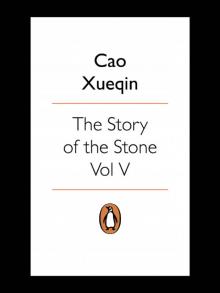 The Dreamer Wakes
The Dreamer Wakes The Warning Voice
The Warning Voice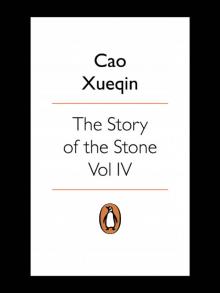 The Debt of Tears
The Debt of Tears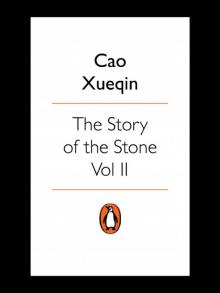 The Crab-Flower Club
The Crab-Flower Club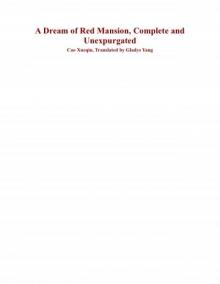 A Dream of Red Mansion
A Dream of Red Mansion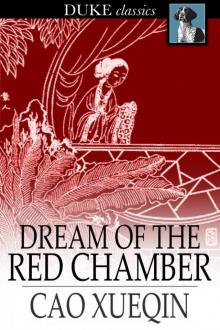 The Dream of the Red Chamber (Selection)
The Dream of the Red Chamber (Selection)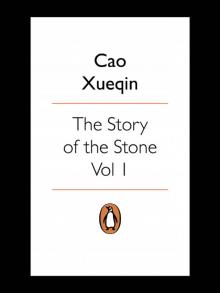 The Golden Days
The Golden Days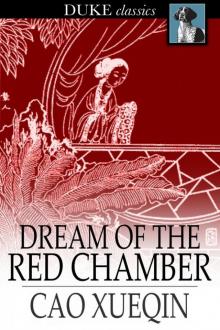 The Dream of the Red Chamber
The Dream of the Red Chamber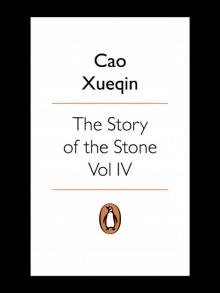 The Story of the Stone
The Story of the Stone